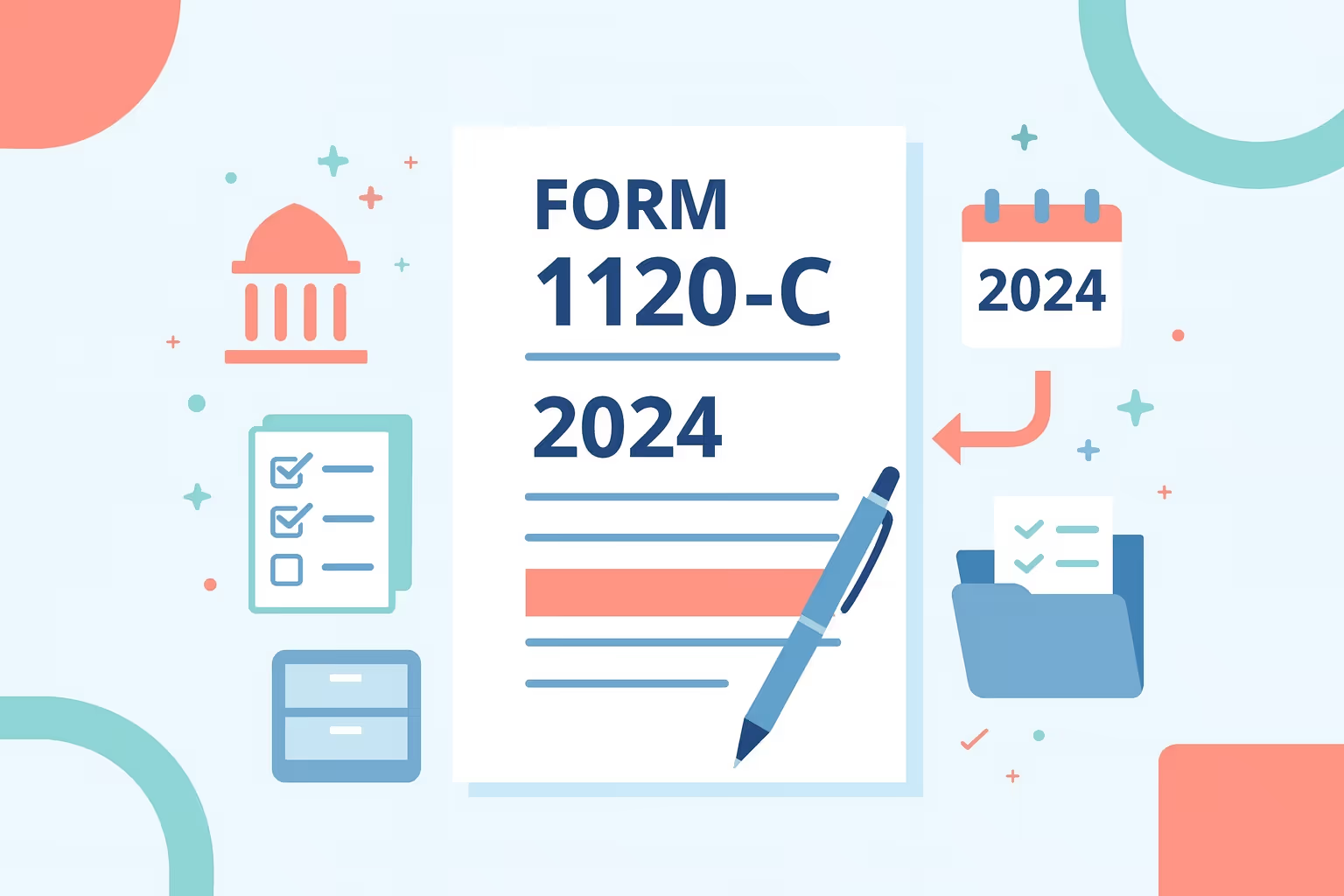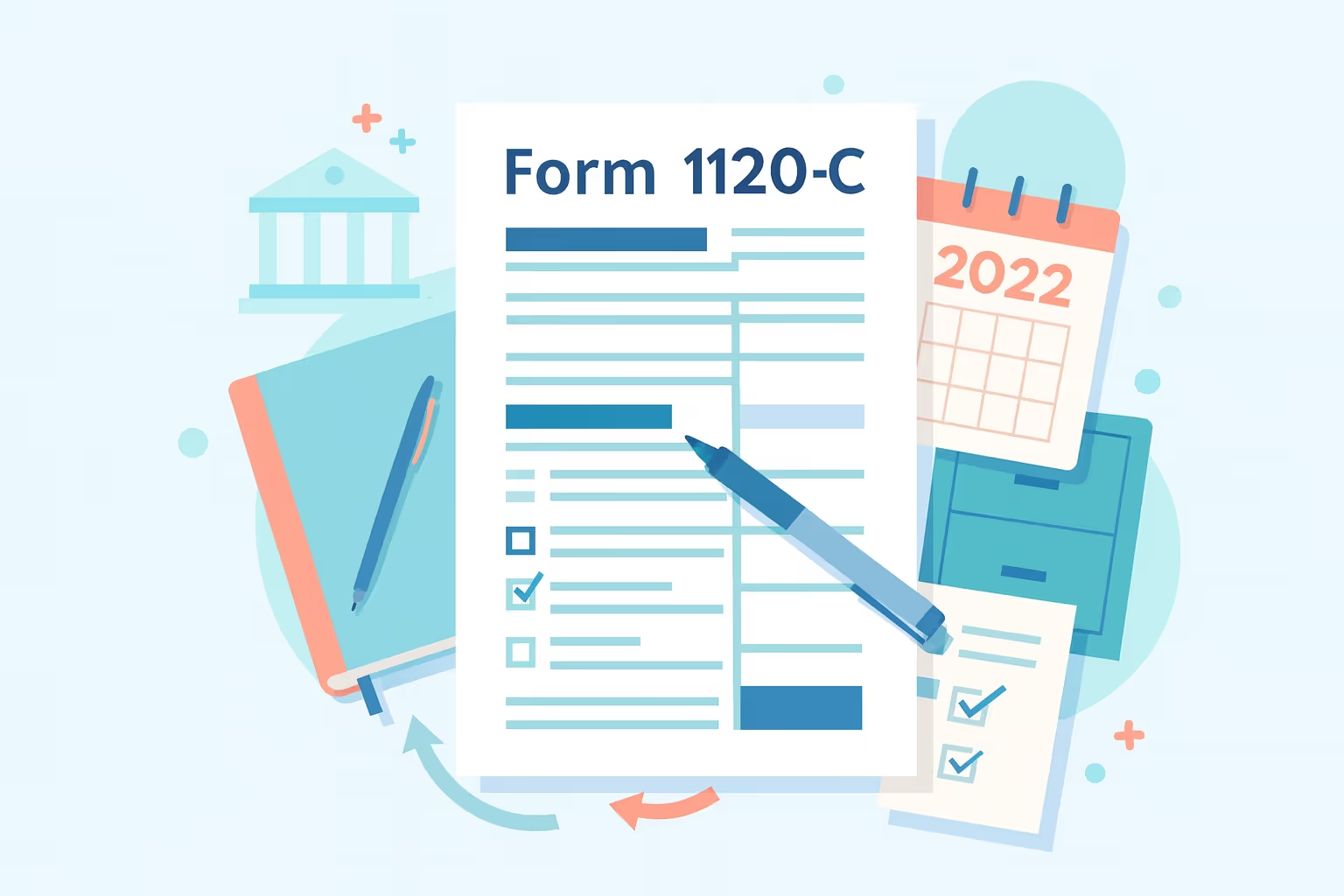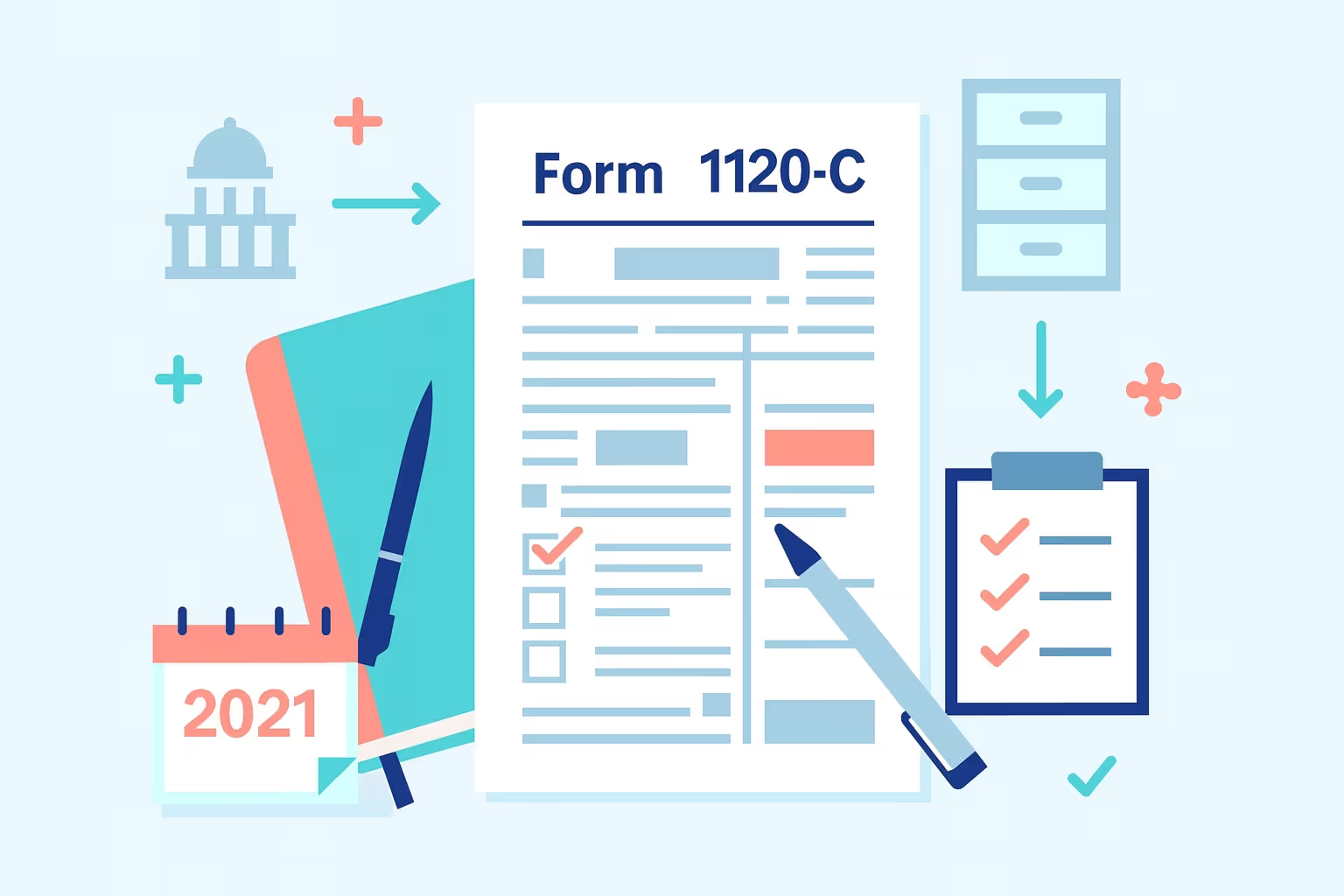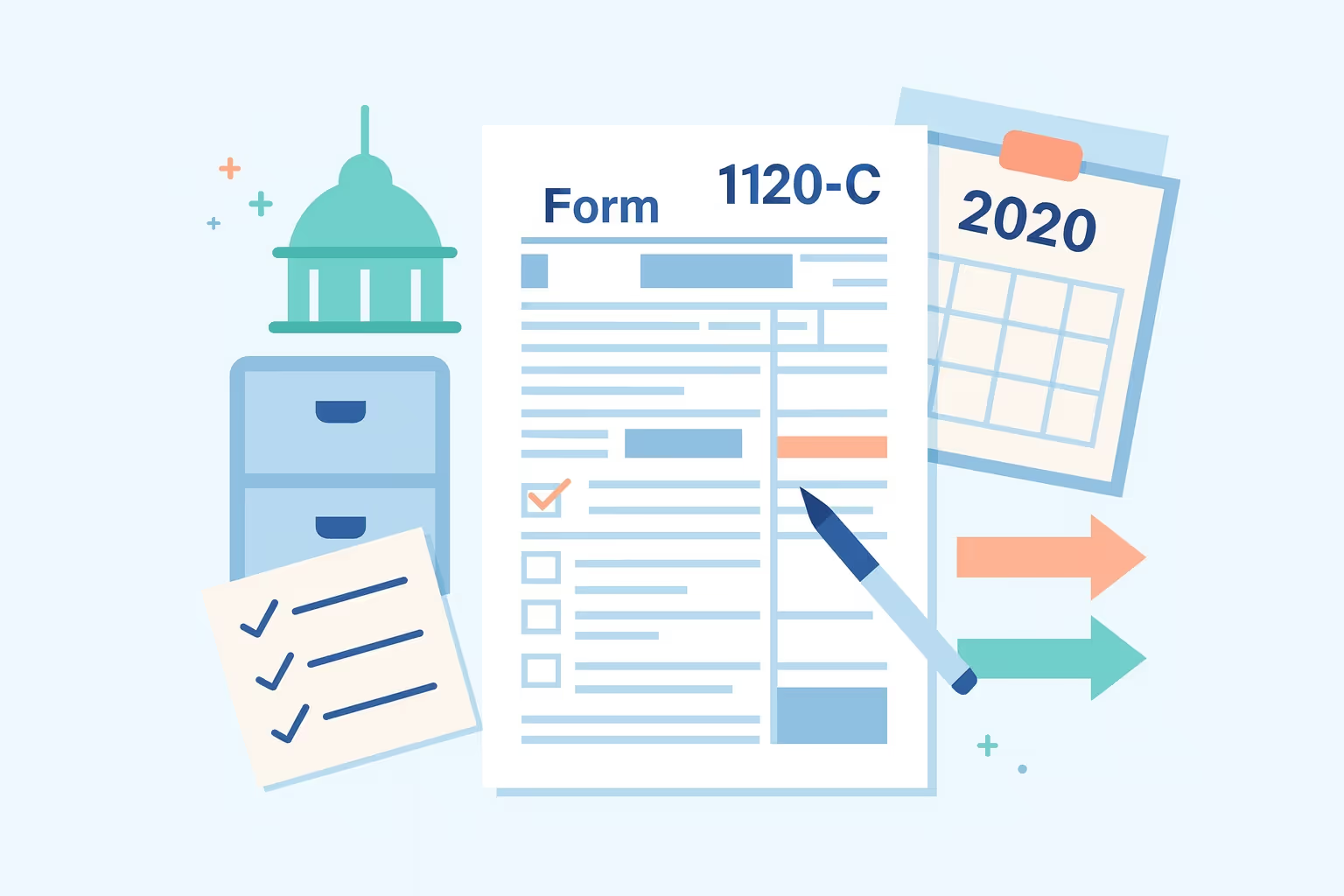
Form 1120-C 2019 instructions help cooperative associations properly prepare and file their federal income tax return with the Internal Revenue Service. The form applies to cooperatives that receive income, report deductions, and calculate taxable income under Subchapter T of the Internal Revenue Code. It ensures that corporations operating on a cooperative basis accurately report profits, losses, credits, and distributions to members while fulfilling their annual tax obligations.
For the 2019 taxable year, the IRS implemented several updates that affect how cooperatives determine their tax liability and pay estimated tax. These include changes to the Section 199A(g) deduction, revised penalty thresholds for late filings, and updated rules for charitable contributions and disaster-related credits. Understanding these updates helps taxpayers maintain compliance, accurately report financial data, and avoid unnecessary penalties or interest.
This guide provides a comprehensive, step-by-step overview of how to complete, file, and mail Form 1120-C efficiently. It covers key topics, including identifying information, income and deduction reporting, and payment requirements. Whether filing by mail or choosing to electronically file through an approved provider, cooperative members and accountants can use this resource to prepare a precise, accurate, and complete 2019 income tax return.
Understanding IRS Form 1120-C
Form 1120-C is the official income tax return used by cooperative associations to report gross income, deductions, credits, and taxable income to the Internal Revenue Service. It is designed for cooperatives operating under Subchapter T of the Internal Revenue Code, ensuring that they accurately report both patronage and non-patronage income. Completing the form helps cooperatives determine their total tax liability, identify applicable deductions, and ensure compliance with federal law.
Purpose of Form 1120-C
- The form allows cooperatives to report all income earned during the taxable year, including sales, services, and capital gains.
- It provides a method to calculate the organization’s tax liability after deducting allowable business expenses.
- It ensures that corporations structured as cooperatives comply with tax reporting requirements under Section 1381 of the Internal Revenue Code.
Who Must File?
- Any cooperative that operates on a cooperative basis and allocates earnings to members or patrons based on business done must file Form 1120-C.
- Farmers’ cooperatives, as outlined in Section 521, must still file the form even if they have no taxable income.
- Nonexempt cooperatives and certain corporations that qualify under Subchapter T also fall under the filing requirement.
Who Is Exempt?
- Some organizations are not required to file this return. These include tax-exempt entities under Chapter 1, insurance companies, mutual savings banks, and rural electric or telephone cooperatives.
- Exempt cooperatives must still meet specific filing and recordkeeping conditions if they receive income from unrelated business activities.
Annual Filing Requirement
- Cooperatives must file Form 1120-C annually, regardless of whether they report profit or loss for the year.
- Even inactive or dormant cooperatives are required to file unless they have been legally dissolved.
- Failure to file by the due date may result in penalties and interest, though the IRS may waive penalties if reasonable cause is established.
By understanding these filing obligations, cooperative associations can ensure their income tax return are accurate and timely. Proper completion of Form 1120-C helps maintain compliance with federal requirements and prevents issues with the IRS during review or future tax years.
What’s New for the 2019 Tax Year?
For the 2019 taxable year, the Internal Revenue Service introduced several changes that directly affect cooperatives filing Form 1120-C. These updates were designed to align with recent tax law amendments and to ensure more accurate reporting of deductions, payments, and credits.
Section 199A(g) Deduction
- Certain agricultural or horticultural cooperatives may qualify for the Section 199A(g) deduction.
- This deduction allows eligible organizations to reduce taxable income based on qualified production activities.
- Cooperatives should carefully review the IRS instructions to verify eligibility and compute the deduction correctly using the proper line on the form.
Increased Late Filing Penalties
- The minimum penalty for failing to file a return more than 60 days after the original due date increased to the smaller of the tax shown or $435.
- This adjustment emphasizes the importance of filing or requesting an extension on time.
- Penalties can continue to accrue if the failure continues for each partial month, and the return remains unfiled.
Disaster Relief and Charitable Contribution Changes
- Contributions made to qualified organizations for disaster relief between December 31, 2017, and February 19, 2020, are not subject to the usual 10% limitation.
- This temporary measure allows affected cooperatives to deduct higher charitable contributions related to disaster recovery.
Other Key Updates
- Employers operating in qualified disaster areas may claim the Employee Retention Credit using Form 5884-A.
- Cooperatives that invested in Qualified Opportunity Funds during 2019 must report these holdings using Form 8997.
- Filing accuracy is essential, as missing schedules or incorrect data may delay processing or increase tax liability.
These updates were established to simplify cooperative reporting and promote compliance. Understanding these revisions ensures that taxpayers can apply all eligible benefits and avoid unexpected penalties.
Step-by-Step Form 1120-C Instructions
Completing the Header Information
- Enter the cooperative’s legal name, address, EIN, and the taxable year or fiscal year dates exactly as shown in IRS records to prevent processing delays.
- Indicate the cooperative type and check whether the return is initial, amended, or final so the Internal Revenue Service applies the correct rules.
- Review the first page for accuracy before proceeding to ensure the income tax return reflects complete and consistent information.
Income Section (Lines 1–10)
- Report all gross income from patronage and nonpatronage activities, subtract returns and allowances, and use Form 1125-A to compute cost of goods sold and profit.
- Include capital gains and other property gains as required, and clearly identify amounts that receive income from nonpatronage sources for proper tax treatment.
Deductions Section (Lines 11–24)
- Claim ordinary and necessary deductions such as wages, officer compensation, interest, and charitable contributions, retaining documentation to support each reported amount.
- If eligible, compute and enter the Section 199A(g) deduction and any applicable credits, ensuring that the figures reconcile with the schedules for the taxable year.
- Classify deductible dividends, patronage refunds, and other payment items correctly so that total tax and tax liability reflect the proper balance.
Tax Computation (Lines 25–26)
- Subtract total deductions from total income to determine taxable income, apply Section 1382 adjustments, and use Schedule J to compute tax shown, alternative minimum tax, and applicable credits.
- Verify that the computed total tax matches the tax payments and each estimated tax payment made during the year to avoid penalties and interest.
- If an overpayment exists, choose to request a refund or apply the amount to estimated tax for the next business day, consistent with IRS rules.
Filing and Submission Procedures
The Internal Revenue Service offers several filing methods for Form 1120-C, depending on the cooperative’s business structure and available resources. Filing correctly and on time helps maintain compliance and minimizes delays in document processing.
Paper Filing Instructions
- Cooperatives with a principal business in the United States should mail their completed form to the Department of the Treasury, Internal Revenue Service Center, Ogden, UT 84201-0012.
- Foreign or U.S. possession-based cooperatives should use the address: Internal Revenue Service Center, P.O. Box 409101, Ogden, UT 84409.
- When mailing, ensure that all schedules and attachments are included in the proper sequence.
Electronic Filing (E-File)
- The IRS allows certain corporations to electronically file Form 1120-C through approved tax software.
- E-file options can reduce processing time and minimize errors compared to paper filing.
- Cooperatives should verify with their software provider whether e-file is available for their type of return.
Private Delivery Services (PDS)
- Certain private delivery services, such as FedEx and UPS, are authorized by the IRS to deliver tax returns.
- PDS cannot deliver to P.O. boxes, so returns must be sent to a physical IRS address.
- The date the delivery service records the package as sent counts as the filing date if it meets the requirements for timely mailing.
Proper Return Assembly
- Attach schedules and forms in the correct order as listed in the IRS instructions.
- Include all supporting statements, such as details of deductions and credits.
- Ensure the cooperative’s name and EIN are displayed on every page.
Filing the form accurately and using an approved submission method ensures compliance with IRS regulations. Whether filing by mail or electronically, cooperatives should retain a complete copy of the return and proof of submission for their records.
Payment and Estimated Tax Requirements
Cooperatives are required to make timely tax payments to the Internal Revenue Service to avoid penalties and interest. Understanding when and how to make these payments is essential for maintaining compliance and ensuring that the correct full amount is credited to the cooperative’s account.
Electronic Payment Requirements
- All corporations, including cooperatives, are required to make federal tax deposits using the Electronic Federal Tax Payment System (EFTPS).
- Payments can be made online, by phone, or through a financial institution that supports electronic deposits.
- Taxpayers must submit their payments by 8 p.m. Eastern Time on the business day preceding the due date.
- Same-day wire transfers are available through a financial institution using the Federal Tax Collection Service (FTCS). This option is often used when payments are due immediately or when a prior payment was missed.
Estimated Tax Payments
- Cooperatives that expect to owe $500 or more in tax for the taxable year must pay estimated tax in quarterly installments.
- These payments are typically due on the 15th day of the 4th, 6th, 9th, and 12th months of the taxable year.
- If a due date falls on a weekend or legal holiday, payments should be made on the next business day.
- Form 1120-W can be used to help estimate the amount due for each installment.
Penalty Avoidance Tips
- To avoid penalties, taxpayers should ensure that each estimated tax payment is made by its due date.
- Late or incomplete payments may result in penalties unless the cooperative can show reasonable cause.
- The IRS may waive penalties if specific criteria are met, such as unforeseen financial hardship or incorrect prior-year estimates.
Cooperatives that follow these payment guidelines help ensure their tax liability is satisfied in a timely manner. Consistent and accurate payments also reduce the risk of penalties and improve financial planning throughout the taxable year.
Required Schedules and Attachments
Cooperatives must include several schedules and supporting forms with their income tax return to fully report income, deductions, and credits. These attachments provide additional information required by the Internal Revenue Service to verify calculations and ensure compliance with tax law.
Schedule C – Dividends and Special Deductions
- Schedule C is used to report dividends received from domestic or foreign corporations and to determine related deductions.
- It helps cooperatives calculate their allowable dividends received deduction based on ownership percentage.
Schedule G – Patronage and Nonpatronage Allocation
- Schedule G requires cooperatives to separate income and deductions between patronage and nonpatronage activities.
- This allocation is crucial for determining which portion of income qualifies for deductions under Section 1382.
Schedule H – Section 1382 Deductions
- Schedule H is used to report specific deductions unique to cooperatives, including patronage dividends and allocations to members.
- It helps identify deductions that reduce taxable income, but must be adequately documented to qualify.
Schedules J through M
- Schedule J is used to compute tax liability, including the alternative minimum tax and credits.
- Schedule K collects additional information about ownership, accounting methods, and business activity.
- Schedule L reports balance sheets at the beginning and end of the year.
- Schedule M-1 or M-3 reconciles book income with taxable income. Cooperatives with total assets of $10 million or more must file Schedule M-3 instead of M-1.
Completing these schedules properly ensures that all necessary information is included in the return. Each attachment supports transparency and accuracy in tax reporting, which helps prevent delays in processing and potential IRS inquiries.
Common Mistakes to Avoid
Even minor filing errors can result in processing delays or penalties. Cooperatives should review their income tax return carefully before submission to avoid common mistakes that could affect their tax liability or refund.
Frequent Filing Errors
- Failing to make required estimated tax payments or submitting them after the due date can lead to additional interest and penalties.
- Omitting schedules or attaching them in the wrong order may result in incomplete processing or rejection of the return.
- Misallocating income between patronage and nonpatronage activities can result in incorrect deductions and misreported taxable income.
- Incorrectly calculating the Section 199A(g) deduction or failing to meet eligibility criteria may reduce allowable benefits.
- Failing to include necessary forms, such as Form 851 for consolidated returns or Form 1122 for subsidiaries, may result in correspondence or processing delays.
Payment and Deposit Errors
- Failing to use EFTPS for required electronic deposits or missing deposit deadlines can result in late payment penalties.
- Failing to pay the full amount due by the original due date of the return may generate interest charges.
- Failing to account for additional payments for interest or penalties on underpayments can negatively impact the cooperative’s compliance standing.
Documentation and Record Errors
- Submitting returns without an authorized signature invalidates the filing and requires resubmission.
- Forgetting to include the cooperative’s EIN on each page and supporting statement can delay identification and processing.
- Failing to maintain adequate records to support reported income, deductions, and credits may result in disallowed claims during an IRS audit.
By double-checking all information, verifying payments, and maintaining accurate records, cooperatives can reduce the likelihood of errors and ensure compliance. A thorough review before submission helps the IRS process returns efficiently and prevents issues in future taxable years.
Zero-Activity and Dormant Cooperative Filings
Cooperatives that had no financial activity during the taxable year are generally still required to file Form 1120-C. The Internal Revenue Service considers filing mandatory unless the cooperative has been formally dissolved under state law. Filing a zero-activity income tax return helps maintain good standing and prevents penalties for noncompliance.
Filing Requirements for Inactive Cooperatives
- Cooperatives must complete all identifying information on the first page, including the name, address, and Employer Identification Number.
- Each income and deduction line should show a zero if no transactions occurred during the taxable year.
- An explanatory statement may be attached to clarify that the cooperative had no activity, assets, or income during the period.
Completing a Zero-Activity Return
- Do not write phrases such as “No Activity” or “See Attached” in place of required entries.
- Use zeros on all applicable lines and include any schedules that are usually required.
- Check the box indicating “Final Return” only if the cooperative is formally dissolved.
Inactive or dormant cooperatives must continue filing until their status changes or legal dissolution is completed. Consistent compliance helps avoid penalties and ensures that the cooperative remains recognized by both the IRS and relevant financial institutions.
First-Time Filer Guidance
Cooperatives filing Form 1120-C for the first time must understand the distinct rules that apply to cooperative taxation. Because cooperative taxation differs from standard corporate taxation, it is essential to follow IRS guidance carefully and maintain accurate financial records.
Preparation Checklist
- Obtain an Employer Identification Number (EIN) before filing.
- Determine whether the cooperative qualifies as exempt under Section 521 or is a nonexempt cooperative.
- Establish an account with EFTPS for electronic payments.
- Gather records related to patronage and nonpatronage income, deductions, and credits.
- Review the original due date for filing and payment requirements.
Understanding Cooperative Tax Principles
- Cooperatives are taxed only once on patronage income distributed to members, avoiding double taxation.
- Patronage income must be separated from nonpatronage income for accurate reporting and deduction eligibility.
- Deductions for dividends, patronage refunds, and other payments must be documented appropriately.
Recordkeeping Best Practices
- Maintain detailed records of all member transactions and patronage allocations.
- Keep supporting documentation for income, expenses, and credits for at least three years after filing.
- Reconcile the cooperative’s financial statements with its tax records to ensure accuracy.
Professional Assistance
- Due to the complexity of cooperative taxation, new filers should consider consulting a qualified tax professional who is familiar with Subchapter T and cooperative reporting requirements.
- Professional guidance can help identify deductions, verify compliance, and minimize errors when filing electronically or by mail.
Proper preparation ensures that new cooperatives meet IRS requirements and file a complete and accurate income tax return. Following the official Form 1120-C 2019 instructions carefully helps new filers avoid penalties and establish consistent filing practices for future taxable years.
Frequently Asked Questions
What are the instructions for Form 1120-C 2019?
Form 1120-C 2019 instructions guide cooperatives in completing their federal income tax return. The form enables corporations operating on a cooperative basis to report their gross income, deductions, credits, and taxable income to the Internal Revenue Service. Following these instructions ensures the cooperative calculates its total tax liability correctly and files by the appropriate due date for its taxable year or fiscal year.
When is the due date for filing Form 1120-C?
The due date for Form 1120-C depends on the cooperative’s fiscal year. It is generally due by the 15th day of the 9th month after the end of the taxable year. If the original due date falls on a weekend or legal holiday, the next business day becomes the filing date. Timely filing prevents penalties and interest from accruing on unpaid tax liability.
How should a cooperative pay estimated tax for the year?
A cooperative must pay estimated tax if it expects its total tax liability to be $500 or more for the taxable year. Estimated tax payments are typically due quarterly and can be made through the Electronic Federal Tax Payment System. Payments made through a financial institution must reach the IRS by 8:00 p.m. Eastern Time on the business day preceding the due date.
Can Form 1120-C be electronically filed?
Yes, cooperatives can electronically file their income tax return through approved IRS e-file providers. Submitting through e-file allows taxpayers to pay electronically, receive instant confirmation, and reduce common mailing or processing errors. This method ensures the Internal Revenue Service properly records the date, total tax amount, and payment received, providing greater accuracy and faster refund or balance confirmation for corporations.
What happens if a cooperative fails to file on time?
If a cooperative fails to file by the original due date, penalties and interest are assessed for each partial month the failure continues. The penalty is usually based on the tax shown on the return and can increase until the full amount is paid. However, the Internal Revenue Service may waive penalties if the cooperative demonstrates reasonable cause, satisfies specific criteria, and promptly submits its payment.
Are capital gains and dividends reported on Form 1120-C?
Yes, cooperatives must report all capital gains, dividends, and other forms of income on their income tax return. These amounts contribute to the organization's gross income and determine its taxable income for the taxable year. Accurately reporting these items ensures proper calculation of tax liability and compliance with Internal Revenue Service requirements, preventing errors or discrepancies in the cooperative’s financial statements.
Where can taxpayers find additional information?
Taxpayers can refer to the Internal Revenue Service website for general information, corporate filing guidance, and official instructions for Form 1120-C. Each IRS form includes a page with the date of the last review or update, confirming its most recent revision. For help with deductions, credits, amended returns, or estimated tax payments, taxpayers may contact the IRS directly or consult a qualified financial professional for additional information and clarification.
























